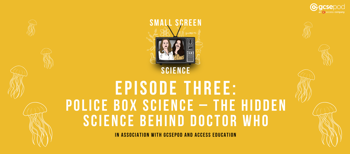
Want to know if you'd prefer to travel to the past or future like the Doctor? According to a YouGov poll discussed in the episode, 58% of people would choose to visit the past while only 28% would venture into the future. Interestingly, 18-24 year olds are more likely to want to travel to the future than those over 6
Watch…
Spotify: https://open.spotify.com/show/7ka0hbd2EX0ZjvFBqnBDMU
Apple: https://podcasts.apple.com/gb/podcast/small-screen-science/id1511181067
Fun Fact
Did you know there are real-life immortal organisms that can "regenerate" somewhat like the Doctor? The Turritopsis dohrnii jellyfish (nicknamed the "immortal jellyfish") can revert from its mature stage back to its juvenile polyp stage when exposed to environmental stress, physical assault, or when it becomes sick or old. Through a process called transdifferentiation, it transforms differentiated cells into new types of cells, essentially restarting its life cycle. Theoretically, this cycle can continue indefinitely if the jellyfish isn't killed – making it biologically immortal! No wonder scientists in aging research and pharmaceuticals are studying these fascinating creatures so closely!
Listener Challenge
We're fascinated by the intersection of fictional technology and real-world science! Your challenge: Research the "sonic screwdriver" concept and find a real-world example of how ultrasound technology is being used in innovative ways in medicine or engineering today. Has there been any progress since the 2016 University of Bristol experiment mentioned in our episode? What other Doctor Who technologies might be closer to reality than we think?
Access GCSEPod Science Resources
Want to use this episode in your classroom? Here are some discussion points to explore with students:
- How does Einstein's theory of relativity explain the relationship between gravity, speed, and time?
- Explore regeneration in nature – which animals can regrow limbs or organs, and how might this inform medical research?
- Discuss the ethics of cryonics – what are the scientific challenges and philosophical questions it raises?
- How do storytelling techniques in science fiction help engage viewers while potentially increasing scientific literacy?
Listen to the full episode of Small Screen Science wherever you get your podcasts!
Spotify: https://open.spotify.com/show/7ka0hbd2EX0ZjvFBqnBDMU
Apple: https://podcasts.apple.com/gb/podcast/small-screen-science/id1511181067

 AU & NZ
AU & NZ
 SG
SG
 MY
MY
 US
US
 IE
IE

